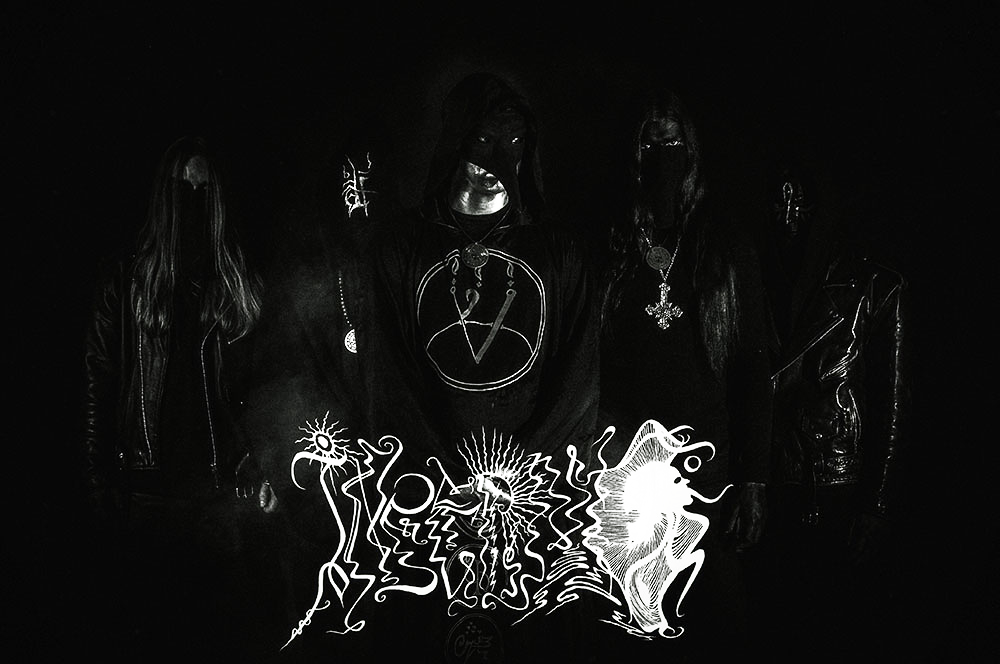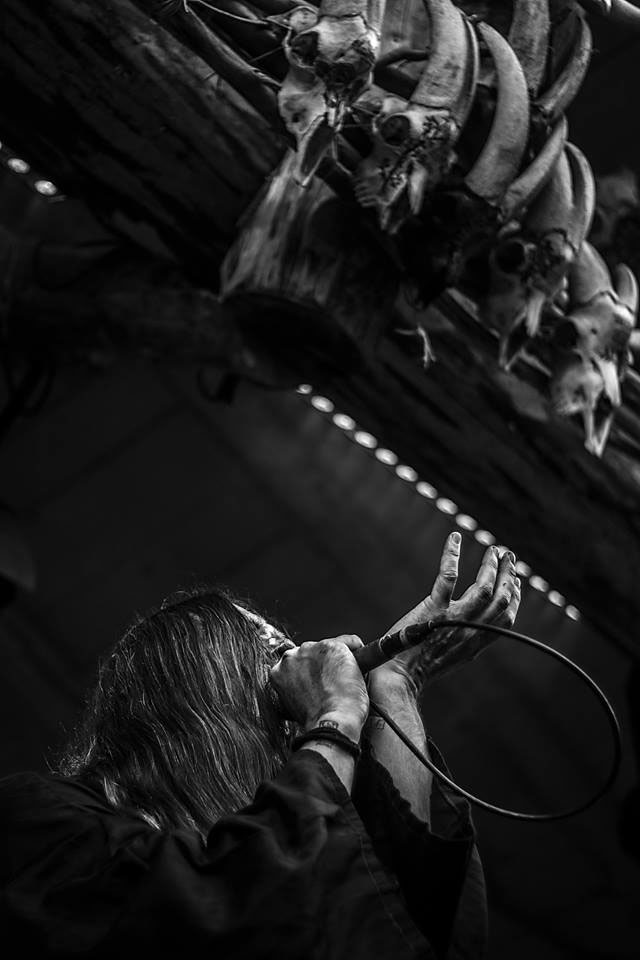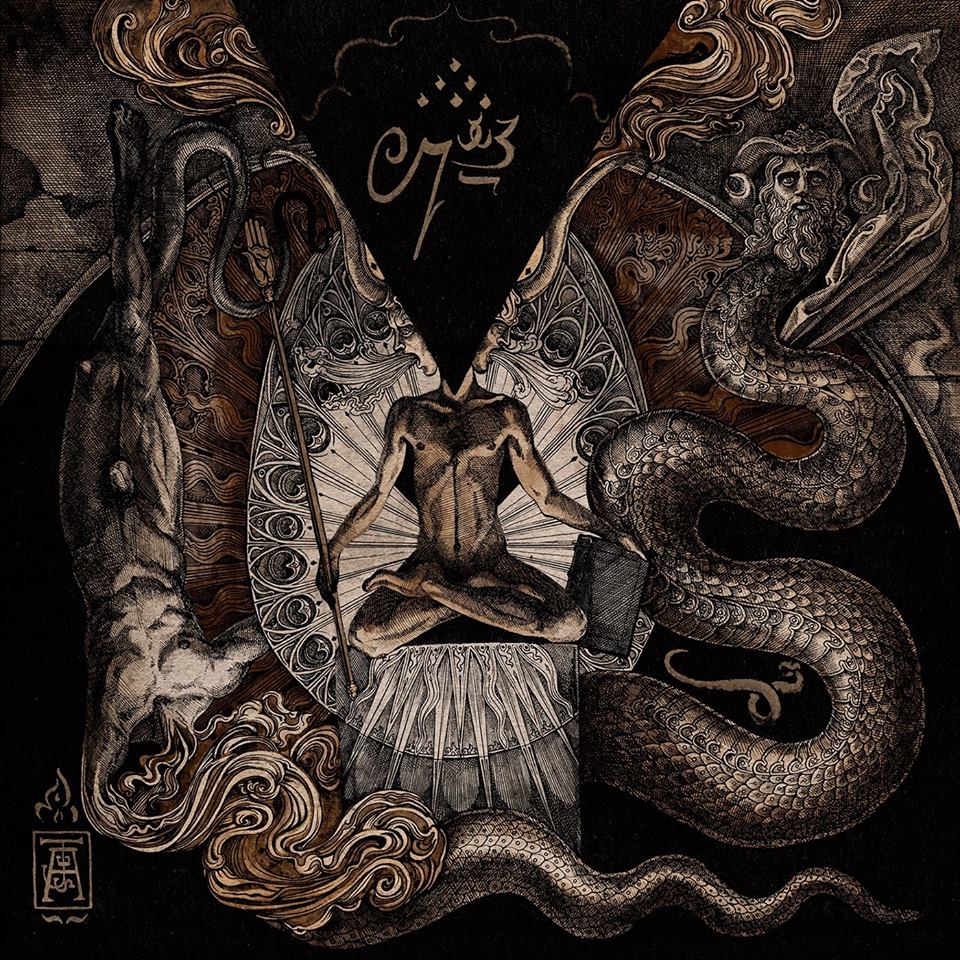Inferno
2017-07-19
by Niklas Göransson
Adramelech, vocalist of Czech black metal band Inferno, takes an intuitive approach to music as well as magic. His knowledge of the heart serves as mandate for humility, and the path towards Hyperborea is a selfless one.
– As we began preparing for our new album, there was an outspoken intent of continuing further down the paths revealed by “Omniabsence Filled by His Greatness” (2013). That record was in many ways a step into the unknown for us – we were eager to find out how far or where it could take us.
High ambitions for the material and an urge to let it develop naturally is why INFERNO’s seventh studio offering, “Gnosis Kardias (Of Transcension and Involution)”, took four years to complete.
– As ideas were growing in the subconscious, other stimuli came from outside. The creative process was highly intuitive, natural and in accordance with both inner and external impulses – it was the only way to go.
What does the title mean?
– ‘Knowledge of the heart’. We came across the term in a book called The Gnostic Jung and the Seven Sermons to the Dead by Stephen A. Hoeller. In a simplified way, it could be said that “Gnosis Kardias” celebrates the discovery of both one’s self and the surrounding micro and macrocosm. It’s an encouragement to remain open to a possibility that there’s more beyond the tangible reality than can be known by reason and senses.
I read with some surprise that there are no keyboards on the new record, how all sonic weirdness in fact stems from creatively applied guitar work.
– The way our guitar tracks are layered… which is what creates this sonic weirdness, as you put it, is not unlike what many other bands do – but Ska-Gul, our guitarist and main composer, has his own strange way of imposing atmosphere. These soundscapes are meant to convey the great variety of emotions and thoughts invested into our music.
He adds that some of these additions came from many hours of experimentation, searching for a particular abstract idea, while others were improvised on the fly.
– Ska-Gul can spend ages playing around with different effects, he cares very little about established norms so it doesn’t matter if the guitars are deformed beyond recognition and resemble keyboards. The words and music are designed to emanate visions, tangible passion, and emotions. Regardless of compositional or technical mastery, music stripped of these qualities is just dead, sterile and forgettable.

During my preparations for this article, I noticed how INFERNO’s conceptual metamorphosis from the Slavonic paganism of their 2001 debut into today’s more esoteric inclinations was the source of some online ridicule. I often find it peculiar when people are dismayed over musicians who evolve past their teenage self; one could hypothesise that thirty-year-olds still clinging to the worldview of their adolescence might not have strayed too far on the pastures of existential contemplation.
– I suspect those internet smart-asses who reproach us for natural, many-years-long, gradual transformation would complain in the same manner if we’d kept playing the same music for twenty years. INFERNO lives through us, it’s the vessel of our personal artistic expression, doing it the other way around – to please anyone else but ourselves – would be pointless. Self-development is a quality all people should strive for since it represents freedom in a social and spiritual sense.
Adramelech adds that the band members were between fifteen and eighteen years old at the time of their first album and as such, perhaps not fully matured in all things philosophical.
– But already back then we were doing our own thing, regardless of what others thought. I’d rather be an internet laughingstock than blindly stick to rigid paths resulting in pathetic stagnation and burnout. To elaborate for those know-it-alls who feel we betrayed something; INFERNO has always stood behind values of European traditionalism and the old natural faith.
What about the Devil?
– He’s always played an important role in the band. Sure, in the early days our veneration for evil was mostly rebellion against Abrahamic doctrine. However, behind simple blasphemy there was a genuine interest in individualism and deeper messages of the Left-Hand Path.
As per usual when conversing with someone proclaiming diabolical affinity, I find myself wondering if there’s ever been any actual communication with a perceived autonomous energy identified as the Devil.
– A decade ago I used to goad attendees at our gigs, screaming in people’s faces that I wanted to see Satan in their eyes. During those years, the concerts of INFERNO were very violent and dangerous events – perhaps because the ’satanic’ energies are omnipresent and sometimes it takes very little to rouse them from shadows.
An additional factor to the band’s development has been the many line-up changes since their inception in 1996.
– Contemporary INFERNO seems like a different band musically, lyrically and visually. All the years of development, gathering of experience, and personalities of members passing through – everything manifests through our output in one way or another.
As INFERNO’s sole remaining original member, Adramelech believes all relevant attributes from the early days to still be present.
– They’ve been refined, re-evaluated and used to build upon our past something new for the future. As for those who have a problem with our progression; I often think it’s better to remain silent than to anonymously spew shit online without the smallest interest for even trying to understand what we’re doing.
Let us then attempt to do just that. First off, I’m curious how this esoteric journey began.
– My interest in magic was awakened many years ago, when I began asking myself what lies beyond this reality; the hidden causes and invisible factors which influence our world, society and psyches. I make no claims of being as knowledgeable as certain other bands purport to be, I still regard myself as somewhat of a novice.
He sought to widen his scope of reality, to acquire knowledge potent enough to influence the personal as well as the artistic.
– Our approach to occultism and magic has by necessity always been more intuitive than academic. I try to read everything I get my hands on, but there are not so many Czech authors or translations I find especially useful.
Adramelech explains that his English reading comprehension isn’t quite at the level where he feels comfortable studying complex arcane literature, seeing as how misinterpreting guidelines could potentially prove transcendentally troublesome.
– I soon learned to dislike the lavish ’ceremonialism’ which some of the authors present as magic rituals. I’m sure it works for others but I found my own ways to attain higher states of consciousness, and to awaken specific inner energies allowing me to search deep within both myself and the surrounding world.
This, he says, is the reason why INFERNO’s lyrics are not beseeching demonic entities and the like.
– My magical practices have become more personal, and a similar approach has been chosen for writing lyrics. To evoke sinister mood, I refrain from using descriptions of private rites or just lifting names and terms straight from books.
Prior to adopting this approach, did you ever establish contact with any form of sentient non-physical being?
– Back in the day I tried summoning certain entities and these early experiments contributed to my belief that there are indeed active, sentient forces behind the veil of perceived reality. More successful and seminal were communications with elemental beings during long treks in the woods and mountains.

With celestial correspondence a thing of the past, Adramelech declares his current focus to be on introverted traversing rather than peripheral exploration.
– I strive for self-knowledge and reciprocal communion with my spirit, the higher self. I train my will and strive for balance. Even nowadays though, continuous digging through the unconscious occasionally leads to encounters with presences and archetypes in dreams.
I’ve noticed how Adramelech in both lyrics and interviews makes reference to some manner of illusory reality. However, it’s not entirely clear to me what he’s referring to – meaning, if it’s in a Gnostic sense or more scientific interpretations of the world as a digital reality simulation. There appears to be nods towards both.
– Well, this notion rests on a foundation of many years spent thinking and reading far beyond religious and esoteric literature. There are elements of Gnosticism, Christian mysticism, Buddhism, Taoism – and also literature and academia. For instance, open the “Gnosis Kardias” digipack and the first sentence you see is paraphrased from (American writer) Edgar Allen Poe and (Danish physicist) Niels Bohr.
Performing said inspection yields the following phrase: ‘All that is real is inherently unreal and all that we perceive is a mere dream within a dream.’
– The Poe part comes from his poem A Dream within a Dream. I cannot pinpoint the exact source of Bohr‘s words, but I’m pretty sure they are quoted in books of Roger Penrose, Lee Smolin and others I have. The paraphrased text was initially written in Czech and then translated, so there’s also the small possibility of a certain shift in meaning.
Adramelech says the premise for his contentions of cosmic falsehood stem from flawed human capabilities of perceiving our surrounding universe.
– Mainstream science has also thoroughly put to rest any notion of what we experience with our base senses necessarily being ’real’. My lyrics contain occasional references to quantum physics and the holographic nature of both universe and consciousness, but they are hidden behind esoteric concepts.
Adramelech has previously referenced writers such as Andrew Chumbley and Daniel Schulke as inspirational. Chumbley was a British occultist and author, focused on European witch-lore and a folk-magic tradition known as cunning-craft, as well as the Magister of an arcane society called Cultus Sabbati. Upon his death in 2004, he was succeeded by the aforementioned Schulke – a fellow writer dealing with topics such as comparative religious studies and occult herbalism.
– I’d been told that both authors represent pillars of magic theory and practice, and following my own studies of their writings I’d have to agree – at least from what I’ve been able to make out with my limited English. I appreciated the richness of knowledge they presented, as well as several unorthodox perspectives.
He also felt that certain arcane distinctions outlined by the pair were spot on. Chumbley asserted that the ‘Sabbatic Craft’, as practiced by Cultus Sabbati, was based on older lineages of traditional witchcraft which have little in common with Wicca and similar modernised folk-magic revivals.
– More importantly, their opinions were healthy and well-substantiated – which I especially appreciate given that many occult authors tend to mix everything together as they see fit. Some of Chumbley‘s poems also had a profound impact on me.
Are you interested in plant magic or herblore?
– Not personally, but my partner spends a lot of time gathering certain plants and processing them. As a result, I’ve been treating various ailments of mine with purely natural products and medicaments for many years now.
While reviewing previous interviews, I spotted Adramelech making reference to a ’path towards Hyperborea’. The term Hyperborea originates from Greek mythology, it refers to a utopian land that lies ‘beyond the North Wind’ and is illuminated by a perpetual midnight sun. I am, however, going to take the liberty of assuming that INFERNO’s take on it is more along the lines of Italian Traditionalist philosopher Julius Evola and Russian theosophist Helena Blavatsky
– Yes, I meant Hyperborea as an epitome of advanced traditional human culture in the vein of mentioned authors. To me, it’s the ideal of a culture working on its development in harmony with tradition, nature, and the divine forces around us – one that’s spared the short-sightedness and narcissism so prevalent in contemporary Western society.
He adds that this also means we shouldn’t simply look to the ’glorious past’ for guidance.
– The work must be carried out here and today, with those who will one day inherit this earth in mind. We might hold the opinion that this physical existence is inherently unreal as we strive for the elevation capable of freeing us from this mortal coil, but escapism is not an option either. The omnipresent dualities must be unified.




